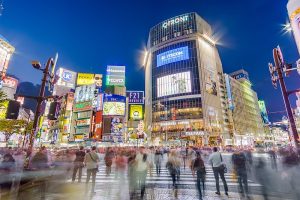Tokyo
17 Tokyo’s Work Culture
Nicholas Powell
Tokyo’s Work Culture

For many people, living and working in Japan could be seen as somewhat of a dream. The opportunity to live and work in a foreign country, especially one so relevant in today’s pop culture, could be a life-changing experience. Working in Japan could very well be a worthwhile experience for many people, but many others don’t know exactly what they are getting into.
With its status as the largest metropolitan economy in the world, Tokyo is a major hub for foreign workers in Japan. Though the amount of foreign citizens is low, there are over 560 thousand foreign nationals living and working in the Tokyo prefecture. Business trips to Tokyo are very common among major companies with some of the largest companies in the world based in the city. Sony, Honda, and Cannon, among many others, are massive global companies that are all based in the city.
Before we can talk about Japan’s work culture, we must first understand how Japan’s society is organized more broadly. Unlike most western countries, Japan is a collectivist society as opposed to an individualistic society. In a broad sense, they are more conscious of the surrounding people than we are in the west, and they give priority to the collective as opposed to the individual in a society. This translates into small things like being quiet on public transport, picking up after themselves more often, and being more reserved in a public setting. This way of life can have huge benefits like public transport, but it can also have downsides like the loss of self and the more conformist nature in the expression of one’s identity. It also has some much bigger impacts, like their use of language, their lifestyle, and the way their work culture has developed.
In Japan, the most important thing you can do in a job is to be present. It matters less whether you are being efficient with your time or you are keeping up with all your responsibilities, and more about whether you were there with your colleagues with the appearance of making progress. Their lives revolve around their work to the point that taking a vacation is frowned upon as abandoning their colleagues. Even if you’re more productive than the guy sitting next to you, maybe you get skipped over for that promotion because you were out sick for a few days while your neighbor was present and supporting their colleagues. While that may not seem like a massive issue, it has many knock-on effects on society at large that have effects today. These issues will only grow as time goes on without significant intervention, and solving these problems is much easier said than done.
As of 2020, the birth rate in Japan was at 1.3 births per woman, and since the pandemic has only sharply declined. The latest estimate of the Japanese population as of October 2022 was 125.5 million, down from the 2020 estimate of 126.6 million, showing just how quickly the population is decreasing. Japan also has one of the oldest populations in the world, with recent estimates stating that 29% of the population is older than 65. Population decline is currently one of the biggest issues facing the country.

Due to the significance that Japan’s society has put on being present at work, many young people are not getting out to meet people as often as us in the west. Instead of going out with friends at the end of the workday, they either are too exhausted from working all day or go out to drink with their colleagues. The drinking culture in Japan is massive, and it is mostly expected of an employee to go out drinking with their colleagues at the end of the day to celebrate. While this is a kind of getting out and around, it’s obviously not the same as meeting new people or having fun with friends.
The coronavirus pandemic has only accelerated this trend. By keeping everyone inside and closing bars, young people were getting out and meeting new people even less than normal. So while the closures may have been necessary to protect the people in one of the most densely populated cities in the world, the effects of the pandemic will permeate much longer than in other areas simply by exacerbating existing issues.
For those who see Japan through the lens of anime and manga, you may see a place like Akihabara and similar places in Tokyo and end up with a vastly different perception of the city than what exists in reality. Take the very same industry for example, where these issues are highly pronounced in various anime studios and manga publications. Wonder Egg Priority was an original anime that aired in the winter 2021 season from studio CloverWorks. The studio, based in Suginami, Tokyo, had three different anime airing in the same season. This was highly unusual, with most large studios putting out two or three shows a year at most. It became clear pretty early on that there were some production issues, with one episode getting delayed a week, causing the finale to slip a whole three months due to scheduling issues.

In a now-deleted tweet, we found out just how bad the situation really was in-studio. After being wheeled into an ambulance twice and receiving a drip at the hospital, animation producer Shota Umehara returned to the studio after only five hours where he says, “It’s wonderful to have something that is more important than your life.” This sentiment was echoed by other staff members with one commenting, “On average, every animator working here has lost around 10 kg of weight.” While this case is on the far extreme end of these problems, most big studios aren’t much further behind in terms of impossible-to-meet deadlines and long working hours. In even more extreme and rare cases, Japanese workers have experienced karoshi. Karoshi (過労死) is a Japanese word specifically meaning “death from overwork.” When your language has a word that specifically refers to when someone dies from working too much, it may be time to change something.
After raising all of these problems, why would anyone want to work in Tokyo? There seems to be a significant amount of downsides. What upsides could possibly make it worth the risk?
While these work culture issues may still plague older and larger companies, many new and smaller companies alongside branches of foreign companies do not share the same problems. The Japanese government and the companies themselves also claim they are trying to fix the issue. It’s now mandatory to take at least five vacation days a year and in 2018, an anti-karoshi law was passed to both study and spread awareness of the issue. The government has also added more national holidays over time, allowing for more time off. These are just some of the many initiatives and laws passed by various bodies and companies to help stop the problem. Though it won’t be an overnight fix, the issues are slowly getting better and with the proper knowledge, it becomes drastically easier to navigate between which companies should be avoided and which companies should be sought after.
Setting boundaries in a work environment is also very important to establish a healthy work-life balance. Going out to drink with colleagues can be fun, but spending the entire day after work with people from work can just make the whole day feel like work. Working in Tokyo also brings many benefits in other ways. Employment stability is very high in the country due to its collectivist organization and non-confrontational attitude. Being fired is a rarity unless you do something egregious to the company or completely illegal. In many industries, especially tech, there is a high demand for workers, so finding a good job may be easier than in other cities. Healthcare in Japan is also better than in many other countries, something Americans will probably find enticing.
The city itself is another amazing benefit. Being the largest city on the planet with nearly 40 million people opens many opportunities, both personal and professional. Tokyo has more Michelin Star restaurants than any other city in the world and can cater to any budget with thousands of options, even outside normal Japanese dishes. The public transport system allows you to get from Tokyo to anywhere else in the country, both fast and cheaply. Within Tokyo, the special wards of Tokyo all offer something unique. Whether it be Akihabara’s unique atmosphere or Shinjuku’s entertainment, Tokyo has something for everyone.
As long as you keep the problems in mind, working in Tokyo or anywhere in Japan can be a life-changing and worthwhile experience. Though there are numerous issues with the work culture in the country, those problems can be overcome with both time and effort. It may not be the perfect experience of your dreams, but there are plenty of positives of working in Tokyo that can easily outweigh the negatives.
Sources and Attribution
Number of registered foreign nationals living in Japan in 2020, by prefecture
Fertility rate, total (births per woman) – Japan
Wonder Egg Priority Producer Hospitalized Due To Overwork
Japanese Work Culture: Here’s How to Survive
Japan has some of the longest working hours in the world. It’s trying to change
Media Attributions
- Tokyo Shibuya Scramble Crossing © Benh LIEU SONG is licensed under a CC BY-SA (Attribution ShareAlike) license
- Drinking in Japan is licensed under a Public Domain license
- CloverWorks Logo is licensed under a Public Domain license

